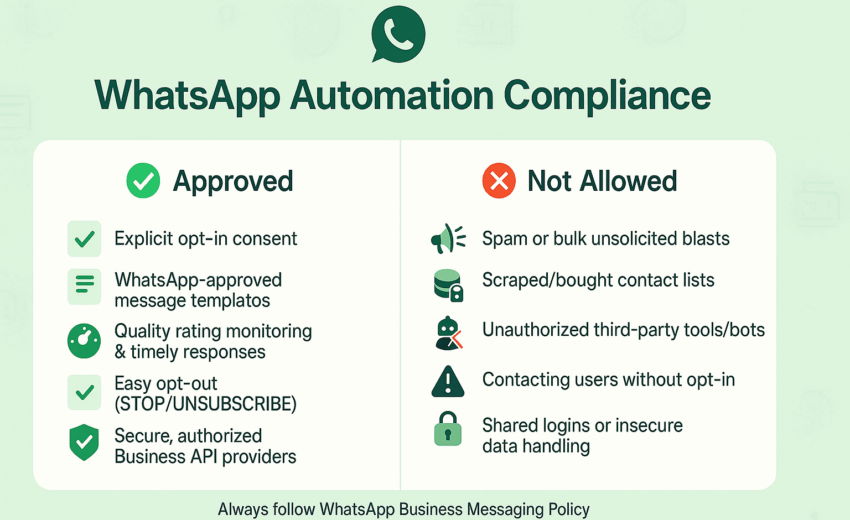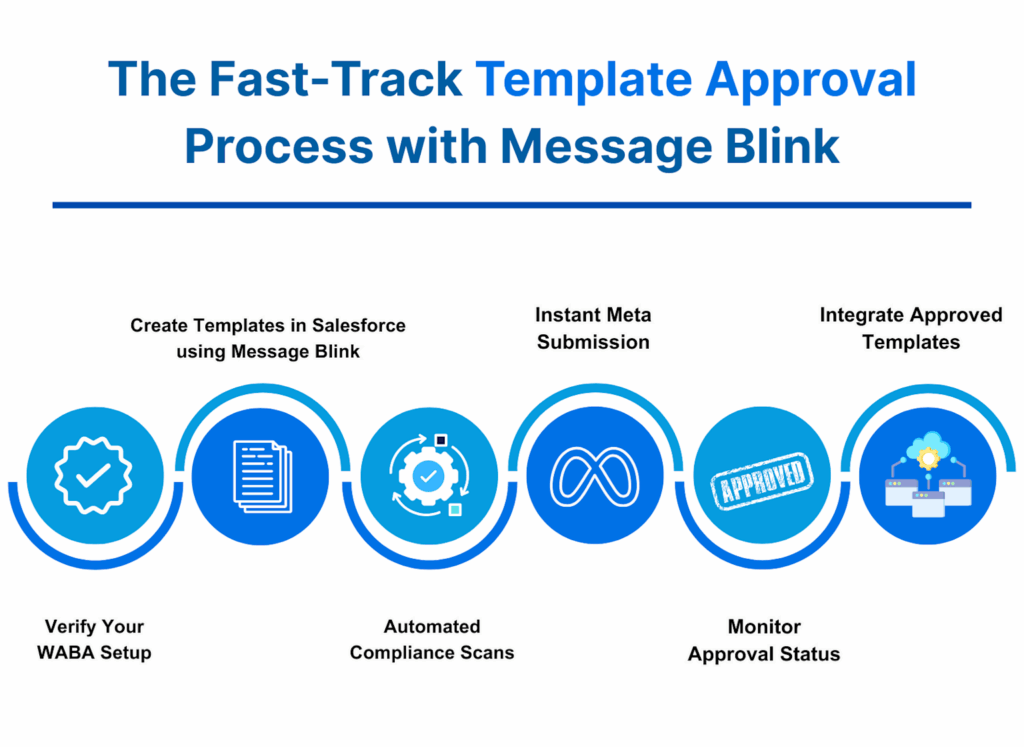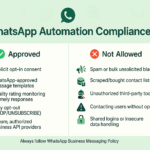
Table of Contents
WhatsApp Automation: How Do You Stay Unbanned?
TL;DR: Essential WhatsApp Automation Compliance Rules
Successfully using WhatsApp automation without getting banned requires following five critical rules: obtain explicit opt-in consent before messaging anyone, use only official WhatsApp Business API or approved third-party tools, maintain personalized, relevant messaging with proper frequency control, secure WhatsApp-approved message templates for business-initiated conversations, and monitor your quality rating to stay in the “green” zone. Non-compliance can result in temporary restrictions, permanent account bans, or legal penalties under data protection laws.
Understanding WhatsApp’s Automation Policies and Enforcement
WhatsApp has implemented sophisticated detection systems to combat unauthorized automation and spam. The platform’s machine learning algorithms analyze behavioral patterns, message frequency, user feedback, and network analysis to identify malicious accounts before they become fully operational. These systems can detect automated behavior through multiple signals including message timing patterns, content similarity, and user interaction rates.
The platform explicitly prohibits several automation practices that trigger immediate enforcement action. Sending unsolicited messages without user consent violates WhatsApp’s fundamental policy. Using unauthorized third-party tools or modified WhatsApp applications like GBWhatsApp or WhatsApp Plus results in permanent bans. Creating multiple accounts on the same network or using suspicious login methods through emulators or browser extensions also triggers security systems.
WhatsApp’s enforcement has become increasingly sophisticated in 2025. The company banned over 6.8 million accounts linked to criminal scam centers in the first six months of 2025 alone. New security features include streamlined blocking from lock screens, real-time spam filtering, and enhanced detection algorithms that make it significantly more difficult for spammers to evade detection.

The Real Consequences of WhatsApp Policy Violations
The consequences of violating WhatsApp’s automation policies extend far beyond temporary inconvenience. Account restrictions typically begin with temporary messaging blocks, preventing businesses from sending messages for set periods. Repeated violations escalate to permanent account bans, completely cutting off access to WhatsApp for business communication.
Beyond platform penalties, businesses face serious operational and legal risks. Violating data protection laws like GDPR or CCPA through improper messaging can result in substantial financial penalties. Companies also risk damage to their reputation and customer relationships when recipients report messages as spam or block the business number.
WhatsApp’s quality rating system directly impacts messaging capabilities and costs. Poor quality ratings triggered by user complaints can downgrade accounts to lower messaging tiers, reducing daily message limits from unlimited to as few as 1,000 conversations per day. This significantly hampers business growth and customer engagement capabilities.
Essential Requirements for Compliant WhatsApp Automation
Explicit Opt-In Consent
The foundation of compliant WhatsApp automation is obtaining verifiable user consent before sending any messages. This consent must be explicit, not assumed, and clearly explain what types of messages users will receive. Pre-checked boxes or including WhatsApp communication in general terms and conditions are not considered valid consent.
Effective opt-in collection can happen through multiple channels including website forms, QR codes, in-store signups, social media ads, and customer support interactions. The key is making the opt-in process transparent and voluntary, clearly stating the business name and the purpose of future communications.

WhatsApp business chat displaying opt-in consent options for promotional messages to comply with WhatsApp policies and user preferences
Official Tools and Approved Solutions
Using only official WhatsApp tools or approved third-party solutions is crucial for maintaining compliance. The WhatsApp Business API is the recommended solution for businesses requiring automation capabilities, offering official support for message templates, automation workflows, and compliance management.
Businesses should avoid unofficial WhatsApp versions, unauthorized browser extensions, or tools that claim to provide bulk messaging capabilities outside WhatsApp’s official framework. These tools are quickly detected and result in immediate account suspension.
Message Template Approval Process
All business-initiated conversations outside the 24-hour customer service window must use WhatsApp-approved message templates. The template approval process typically takes up to 24 hours, with WhatsApp reviewing content for policy compliance, correct formatting, and clarity.
Common rejection reasons include variables placed at the beginning or end of messages, consecutive placeholders, non-sequential variables, duplicate templates, commerce policy violations, and overly vague content. Businesses should carefully craft templates that provide clear value to recipients while adhering to WhatsApp’s formatting requirements.
Illustration highlighting the approval process and applications of message templates in business communication
Proven Strategies to Prevent WhatsApp Bans
Quality Rating Management
Maintaining a high quality rating is essential for avoiding restrictions and accessing higher messaging tiers. Quality ratings are determined by user feedback over the past seven days, with recent feedback weighted more heavily. Green ratings indicate high quality, yellow represents medium quality, and red signals low quality that risks account flagging.
To maintain high quality ratings, businesses should focus on sending relevant, personalized messages that provide genuine value to recipients. Avoiding spam-like content, misleading offers, or clickbait significantly reduces the likelihood of user reports. Regular monitoring of delivery rates and user feedback helps identify issues before they impact account status.
Strategic Message Frequency Control
Controlling message frequency prevents triggering spam filters and reduces user fatigue. Businesses should space out campaigns rather than sending multiple messages in short periods, which can appear automated and suspicious. The messaging should feel natural and human-like, with random delays between messages to avoid detection.
WhatsApp has also implemented per-user messaging limits that cap the total number of marketing messages users can receive from all businesses combined. This makes message quality and relevance even more critical, as businesses compete for limited user attention.
Content Strategy and Personalization
Personalized messaging significantly improves engagement rates and reduces spam reports. Using customer names, referencing past interactions, and sending targeted updates based on preferences or purchase history creates more meaningful connections. Generic, mass-produced messages are more likely to be reported as spam.
Businesses should also provide clear value in every message, whether through useful information, exclusive offers, or important updates. Content should be professional, appropriate for all audiences, and avoid prohibited categories like gambling, adult material, or misleading promotions.

Illustration of WhatsApp API opt-in and opt-out consent process for compliant business messaging
Advanced Compliance Techniques for Long-term Success
Comprehensive Opt-Out Management
Providing easy opt-out options is both a compliance requirement and a best practice for maintaining positive customer relationships. Every marketing message should include clear unsubscribe instructions, such as “Reply STOP to unsubscribe”. Businesses must honor opt-out requests immediately to maintain trust and compliance.
Advanced opt-out management includes automatically removing unsubscribed users from all messaging lists and maintaining comprehensive records of consent status. This prevents accidental messaging to users who have withdrawn consent and demonstrates compliance with data protection regulations.
CRM Integration and Data Management
Integrating WhatsApp automation with Customer Relationship Management (CRM) systems ensures consent data remains up-to-date and prevents unauthorized messaging. Well-integrated CRM systems automatically sync customer preferences, consent status, and communication history.
Proper data management also includes secure storage of consent records, regular audits of contact lists, and automated removal of inactive or disengaged users. This improves engagement rates and reduces the risk of spam reports.
Automation with Human Oversight
While automation provides efficiency, maintaining human oversight ensures quality and compliance. WhatsApp’s Business Platform policies require clear escalation paths for automated responses, including in-chat human agent transfer, phone support, web support, in-store visits, or support forms.
Businesses should implement monitoring systems that flag unusual patterns, failed messages, or negative user feedback for human review. This proactive approach helps identify and resolve issues before they impact account status.
Monitoring and Maintaining Your Account Health
Quality Rating Surveillance
Regular monitoring of account health metrics is crucial for maintaining compliance and preventing restrictions. Businesses should check their WhatsApp Business Manager daily for quality rating changes, messaging limit updates, and any warning notifications.
Key metrics to monitor include delivery rates, user block rates, spam reports, and engagement statistics. Sudden changes in these metrics can indicate potential issues that require immediate attention.
Messaging Tier Management
WhatsApp’s tiered messaging system determines how many unique users businesses can message per day. New accounts start at Tier 1 with 1,000 conversations per day, progressing to 10,000 (Tier 2), 100,000 (Tier 3), and potentially unlimited messaging for verified high-quality accounts.
Upgrading tiers requires maintaining high quality ratings and reaching specific volume thresholds within seven-day periods. Businesses must send their daily limit consecutively for at least two days to qualify for tier upgrades.
Template Performance Analysis
Monitoring message template performance helps identify content that resonates with users and avoid templates that generate negative feedback. Templates can be paused or disabled based on recurring negative user feedback.
Businesses should regularly review template approval rates, user engagement metrics, and feedback patterns to optimize their messaging strategy. Proactive template management prevents issues before they impact account status.
Common Mistakes That Lead to Instant Bans
Network and Registration Errors
Using inappropriate network environments during account registration is a common cause of immediate bans. Registering WhatsApp accounts over VPNs, public Wi-Fi, or server connections triggers security systems. Location mismatches between phone numbers and IP addresses also flag accounts as suspicious.
Creating multiple accounts on the same network appears as spam behavior to WhatsApp’s detection systems. Businesses should use real phones, stable networks, and avoid anything that appears automated or fake during the registration process.
Prohibited Content and Link Sharing
Sending content related to gambling, adult material, fake promotions, or misleading offers quickly triggers user reports and account restrictions. Sharing suspicious links, especially shortened URLs or redirects to untrusted websites, increases the likelihood of being reported as spam.
Businesses should maintain professional, valuable content that builds trust rather than pushes boundaries. Clear, honest communication reduces the risk of user complaints and maintains positive relationships.
Automation Tool Violations
Using unauthorized automation tools or modified WhatsApp applications is one of the fastest ways to receive permanent bans. These tools are easily detected and violate WhatsApp’s terms of service.
Businesses should only use official WhatsApp Business solutions or verified third-party providers that comply with WhatsApp’s policies. The short-term convenience of unauthorized tools never justifies the risk of permanent account loss.
Recovery Strategies If Your Account Gets Flagged
Immediate Response Actions
When accounts receive restrictions or warnings, immediate action can prevent escalation to permanent bans. Businesses should stop all messaging activities, review their recent campaigns for policy violations, and identify the root cause of the issue.
Submitting appeals through WhatsApp Manager with clear explanations and evidence of corrective measures can help restore account status. Appeals should be professional, acknowledge any mistakes, and outline specific steps taken to prevent future violations.
Quality Improvement Strategies
Flagged accounts can often recover by demonstrating sustained improvement in messaging quality over seven-day periods. This involves sending only high-value, relevant messages that generate positive user engagement.
Businesses should focus on responding to user-initiated conversations rather than sending new business-initiated messages while recovering from quality issues. This rebuilds trust with both users and WhatsApp’s quality systems.
Legal Considerations and Data Protection
GDPR and CCPA Compliance
WhatsApp automation must comply with data protection regulations including GDPR (EU) and CCPA (California). This includes informing users how their data is collected, stored, and used, maintaining published privacy policies, and providing opt-out options at any time.
Businesses handling customer data must implement secure storage, encryption, and access controls to prevent unauthorized use. Data localization requirements in some jurisdictions also impact how customer information can be processed and stored.
Industry-Specific Requirements
Different industries face additional compliance requirements for customer communication. Finance, healthcare, and e-commerce sectors have strict regulations for data privacy, consent management, and message content. Businesses must understand and follow industry-specific legal requirements in addition to WhatsApp’s policies.
Maintaining detailed records of user consent, message content, and opt-out requests provides audit trails for regulatory compliance. These records demonstrate compliance efforts and help resolve any legal challenges.
Future-Proofing Your WhatsApp Automation Strategy
Staying Current with Policy Updates
WhatsApp regularly updates its policies, features, and enforcement mechanisms. The platform introduced significant changes in 2025, including enhanced spam detection, new security features, and updated pricing models. Businesses must stay informed about these changes to maintain compliance.
Subscribing to official WhatsApp Business updates, monitoring industry news, and regularly reviewing policy documentation helps businesses adapt to changes before they impact operations. Proactive policy monitoring prevents compliance issues and ensures continued access to new features.
Emerging Technologies and Compliance
WhatsApp continues developing new features like in-app webview experiences, voice calling capabilities, and enhanced automation tools. These features come with specific compliance requirements and usage guidelines that businesses must understand before implementation.
The platform’s focus on AI-powered detection and user experience improvements suggests that compliance requirements will become more sophisticated over time. Businesses should invest in robust compliance systems that can adapt to evolving requirements.
Building Sustainable Growth Strategies
Long-term success with WhatsApp automation requires building genuine customer relationships rather than focusing solely on message volume. Businesses that prioritize user value, consent management, and quality engagement create sustainable competitive advantages.
Investing in proper tools, training, and processes for WhatsApp compliance pays dividends through improved customer relationships, higher engagement rates, and protection from policy changes. The foundation of sustainable WhatsApp automation is treating customer communication as a privilege that must be earned and maintained through consistent value delivery.
Micro-FAQs:
How quickly can WhatsApp ban accounts for automation violations?
WhatsApp can ban accounts immediately upon detecting unauthorized automation tools or spam behavior. The platform’s machine learning algorithms can identify and restrict suspicious accounts within minutes of policy violations.
What’s the difference between temporary restrictions and permanent bans?
Temporary restrictions typically last 24 hours and prevent new message sending while allowing responses to user messages. Permanent bans completely remove access to WhatsApp and cannot be reversed, requiring new phone numbers to continue using the platform.
Can businesses recover from low quality ratings without losing customers?
Yes, businesses can recover by focusing on user-initiated conversations and sending only high-value messages for seven consecutive days. Quality ratings update based on recent feedback, allowing improvement through consistent positive interactions.
WhatsApp automation success requires balancing efficiency with compliance, prioritizing user consent and value over message volume, and maintaining constant vigilance over account health metrics. The businesses that thrive are those that view WhatsApp’s policies not as restrictions, but as guidelines for building meaningful customer relationships that drive sustainable growth.




